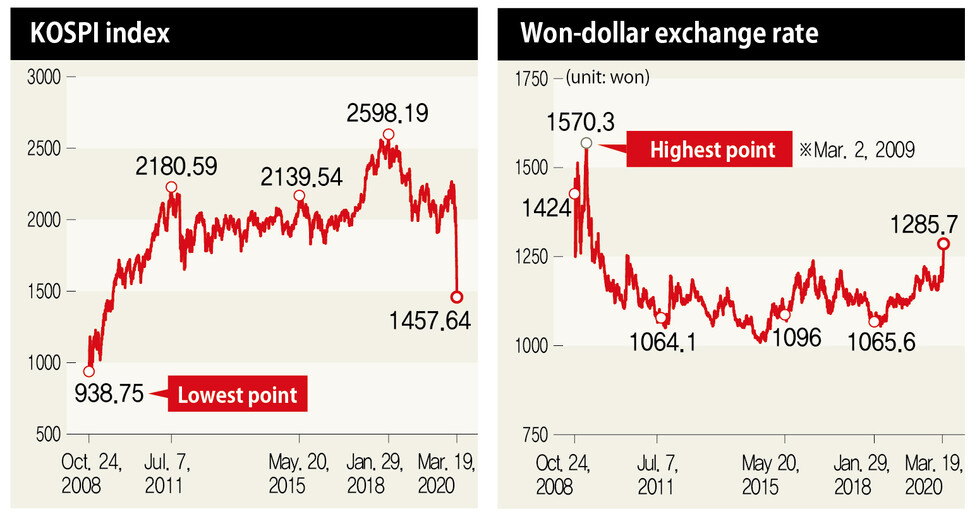hankyoreh
Links to other country sites 다른 나라 사이트 링크
Korean won falls sharply against US dollar as coronavirus panic sweeps the global financial market

As intense fear sweeps the global financial market, investors are dumping stocks, bonds, and nearly all financial assets as they fight to get into ultra-safe assets such as cash, especially the US dollar. The South Korean financial market is no exception: the Korean won fell in value against the dollar, driving the rate up by 40 won to its highest point in 10 years and eight months while the KOSPI fell below 1,500 points, once again for the first time in 10 years and eight months.
At one point on Thursday morning, the dollar/won exchange rate spiked to 1,296 won on Seoul’s forex market, but that was dented in the afternoon, leaving the rate at 1,285.7 won at the close, up 40 won from the previous day. This is the first time the exchange rate has risen above 1,280 won since July 14, 2009, when it stood at 1,293.0 won. The rate swung by 49.9 won over the course of the day, the most fluctuation in 10 years, since May 25, 2010 (53 won), when the Eurozone debt crisis was compounded by the sinking of the ROKS Cheonan corvette.
“It appears meaningless to discuss the current exchange rate, but if uncertainty continues, I think we should be open to the possibility of the rate hitting 1,380 won, the level it was trading during the financial crisis,” said one forex dealer with Citibank Korea.
The KOSPI fell sharply, down 133.56 (8.4%) from Wednesday, ending the day at 1,457.64. This was the first time South Korea’s benchmark index dropped below 1,500 since July 23, 2009. The KOSDAQ index took a tumble as well, closing the day at 428.35, down 11.7%.
Circuit breakers were activated on both indexes on Thursday, following a similar incident last week. The circuit breaker is triggered, suspending trading for 20 minutes, when stock prices fall by more than 8% and stay at that level for at least a minute.
BOK to directly purchase government bondsAnxiety even hit the bond market on Thursday, pushing the Bank of Korea (BOK) to take emergency measures to stabilize the market. In order to secure securities for use in transactions of repurchase agreements, the BOK announced that it would be buying 1.5 trillion won (US$1.19 billion) of South Korean government bonds (by face value). The last time the BOK directly purchased treasury bonds was over three years ago, on Nov. 21, 2016.
Investors in the international financial market are selling off not only risky assets such as stocks and crude oil but even safe assets such as US treasuries as they scramble to get their hands on cash. In the short-term money market, there were even signs of a credit crunch as companies and banks tried to raise operating funds and money to repay short-term liabilities.
The US Federal Reserve System is gearing up to inject cash into money market funds, and the European Central Bank has announced a bond-purchasing program worth 750 billion euros (US$805.45 billion). But that hasn’t eased market jitters. On Mar. 18, the Dow Jones Industrial Average plunged by 6.3%, closing the day at 19,898, the first time in three years it ended below 20,000. The West Texas Intermediate (WTI) crude oil benchmark traded at US$20.37 a barrel, taking a 24% nosedive as higher output in Saudi Arabia and Russia coincided with falling demand as countries around the world impose travel restrictions. That’s the lowest crude oil has been since early 2002.
By Park Hyun, staff reporter
Please direct comments or questions to [english@hani.co.kr]

Editorial・opinion
![[Column] Season 2 of special prosecutor probe may be coming to Korea soon [Column] Season 2 of special prosecutor probe may be coming to Korea soon](https://flexible.img.hani.co.kr/flexible/normal/500/300/imgdb/original/2024/0426/3317141030699447.jpg) [Column] Season 2 of special prosecutor probe may be coming to Korea soon
[Column] Season 2 of special prosecutor probe may be coming to Korea soon![[Column] Park Geun-hye déjà vu in Yoon Suk-yeol [Column] Park Geun-hye déjà vu in Yoon Suk-yeol](https://flexible.img.hani.co.kr/flexible/normal/500/300/imgdb/original/2024/0424/651713945113788.jpg) [Column] Park Geun-hye déjà vu in Yoon Suk-yeol
[Column] Park Geun-hye déjà vu in Yoon Suk-yeol- [Editorial] New weight of N. Korea’s nuclear threats makes dialogue all the more urgent
- [Guest essay] The real reason Korea’s new right wants to dub Rhee a founding father
- [Column] ‘Choson’: Is it time we start referring to N. Korea in its own terms?
- [Editorial] Japan’s rewriting of history with Korea has gone too far
- [Column] The president’s questionable capacity for dialogue
- [Column] Are chaebol firms just pizza pies for families to divvy up as they please?
- [Column] Has Korea, too, crossed the Rubicon on China?
- [Correspondent’s column] In Japan’s alliance with US, echoes of its past alliances with UK
Most viewed articles
- 1Why Kim Jong-un is scrapping the term ‘Day of the Sun’ and toning down fanfare for predecessors
- 2‘We must say no’: Seoul defense chief on Korean, USFK involvement in hypothetical Taiwan crisis
- 3After election rout, Yoon’s left with 3 choices for dealing with the opposition
- 4Two factors that’ll decide if Korea’s economy keeps on its upward trend
- 5BTS says it wants to continue to “speak out against anti-Asian hate”
- 6AI is catching up with humans at a ‘shocking’ rate
- 7Noting shared ‘values,’ Korea hints at passport-free travel with Japan
- 846% of cases of violence against women in Korea perpetrated by intimate partner, study finds
- 9Why Korea shouldn’t welcome Japan’s newly beefed up defense cooperation with US
- 10Ethnic Koreans in Japan's Utoro village wait for Seoul's help